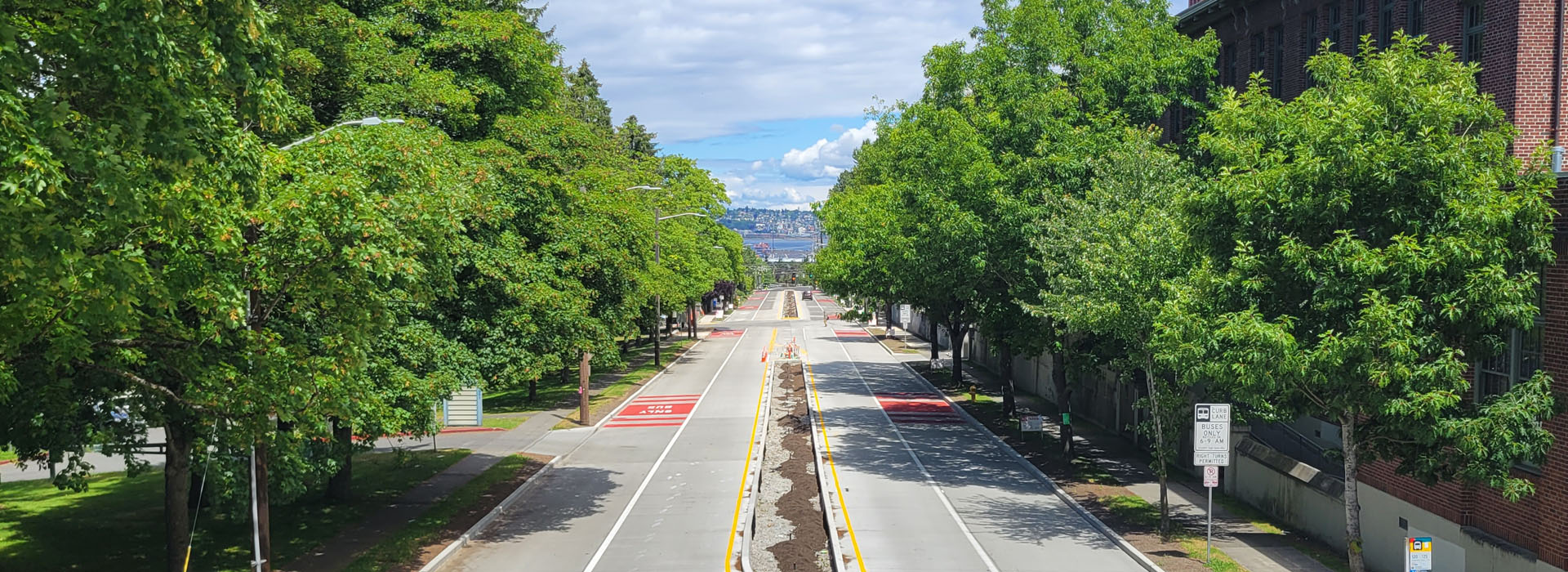
If you scrolled on your smartphone while riding a bus through West Seattle’s Delridge neighborhood in 2019, chances are a digital ad popped up to ask for feedback about the impending RapidRide H Line. What’s more, if your phone is set to Chinese, Spanish or Vietnamese rather than English, the ads were written in that language.
The Seattle Department of Transportation (SDOT) embarked on this multilingual, multicultural advertising campaign using geofencing technology to find its audience, even if they live outside the city limits in neighboring Burien or White Center. As long as you regularly travel through the Delridge neighborhood, SDOT wanted to hear from you.
SDOT ultimately received over 200 survey responses from the Delridge community in 2019, with over 20% learning about the survey through social media or news media. The outreach efforts surfaced concerns about gentrification and pedestrian safety in the neighborhood. This feedback led SDOT to install an additional crosswalk at one of the new bus stations and taught them about the community’s priorities for future infrastructure and outreach.
The brains behind this technologically savvy and culturally adept outreach effort were The Vida Agency, a WMBE multicultural communications company whose expertise is reaching the traditionally hard-to-reach by meeting them on their own terms. “When you have the intention of making things accessible to people, then you can offer up a slew of solutions and you don’t just keep doing the same old tricks, like physical open houses, that only certain people have the flexibility for,” said the agency’s founder and president Amalia Martino.
Vida’s innovative work caught the attention of SDOT’s Public Engagement Manager Dan Anderson. After undergoing three years of training through the City of Seattle’s Race and Social Justice Initiative, Anderson was actively seeking ways to shake up the department’s procurement practice. Records showed that the same four relatively large public affairs and strategic communications firms were scooping up the prime contracts. It was time to make room for newer voices to graduate from subcontractor to prime.

Anderson combed through SDOT’s subcontractor roster and found a surprising number of rising stars like The Vida Agency. “We were seeing a lot of fresh thinking, younger staff, folks coming right out of school and a more diverse leadership pool in the subs than in the leadership of the established consultants,” Anderson said, citing a range of diverse identities like LGBTQ+, Black and Brown women leadership, immigrant and refugee consultants and people for whom English was not their first language. Those backgrounds were important to reach the increasingly diverse public that SDOT serves, Anderson said, because as a white male from the Pacific Northwest, “I can’t have a different lived experience, but we can outsource and find those different lived experiences.”
Anderson and his colleagues supported and provided technical assistance for firms like The Vida Agency, Natalie Quick Consulting and Smash the Box to get them “ready to prime,” while also proving more flexible than is typical in bureaucracy for administrative changes like adding new staff functions to an existing contract.
For The Vida Agency, the ramp up has been measured. At the same time as the RapidRide H Line campaign, they were running similar multicultural outreach for the Reconnect West Seattle program in response to the West Seattle Bridge closure. More recently, they won a prime contract for on-call communications and community engagement for a series of bus lanes. Now they are staffed up with sufficient talent—and a roster of WMBE subs they can trust—to earn $2 million worth of work in the last four years.
“We’re really lucky that we can work with clients like the City of Seattle that prioritize the type of work that we do,” Martino said. “They didn’t just ride the pendulum swing toward equity in the summer of 2020 without actually following through.”
Learn more about the Procurement Transformation project, and stay up to date by signing up for the Innovation & Performance newsletter. You can follow the Seattle Department of Transportation on X @SeattleDOT or check out the SDOT blog.
Read more stories about promising practices in Seattle’s work to make City contracting more efficient, results-driven, equitable, and strategic:
- How Seattle Public Utilities’ On-Call Contracts Give Smaller Engineering Firms a Foot in the Door
- Concrete Results: How Procurement Office Hours Open Doors for Small Businesses
- Seattle City Light leans into efficiencies, time savings in contracting
- Audit Your Way to the Top: How Seattle IT Maximized WMBE Spending
- No Drill Sergeant Required: How Public Art Boot Camp Helps Early Career Artists Get in Shape
Seattle is the recipient of a $1 million Bloomberg Procurement Transformation Grant, a partnership between the Department of Finance and Administrative Services and the Mayor’s Innovation and Performance Team, with technical assistance from the Harvard Kennedy School Government Performance Lab. The project aims to transform City procurement to be more efficient, results-driven, equitable, and strategic. As part of this, the City is highlighting a multi-part series of stories that demonstrate citywide promising practices that can better support our WMBEs. This month’s feature highlights the Seattle Department of Transportation.